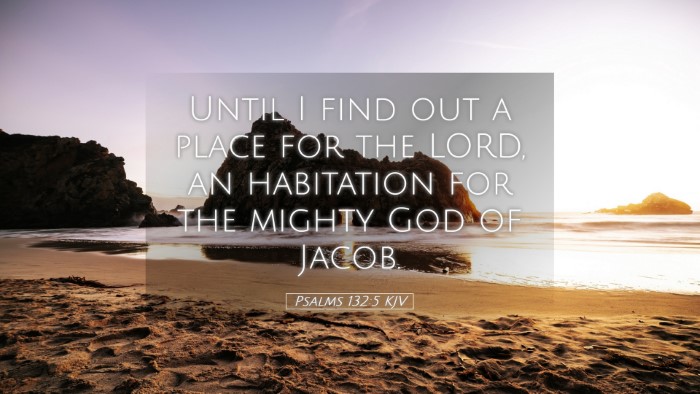Commentary on Psalms 132:5
Psalms 132:5: "Until I find a place for the LORD, a dwelling for the Mighty One of Jacob."
Introduction
This verse serves as a profound expression of desire and dedication towards creating a sacred space for God. The psalmist reflects a theme central to the Scriptures: the longing for God's presence among His people. This commentary explores the historical, theological, and spiritual significance of this verse, drawing insights from esteemed public domain commentaries.
The Context of Psalms 132
Psalms 132 falls within a series of songs of ascent, traditionally sung by the Israelites as they traveled to Jerusalem for worship. This particular psalm celebrates the establishment of God’s presence in the city of David, encapsulating the people’s aspirations and promises regarding the sanctity of their worship.
Verse Analysis
1. The Search for a Dwelling Place
The phrase "Until I find a place for the LORD" emphasizes the earnest and ongoing search for God's dwelling among His people. Matthew Henry notes that this search represents a deep-seated desire to bring God’s presence into the physical realm, reflecting the importance of worship in a dedicated space. For the psalmist, it is not merely about building a structure, but about establishing a relationship between the divine and humanity.
2. The Mighty One of Jacob
Referring to God as "the Mighty One of Jacob" signifies His power and faithfulness to the patriarchs. Adam Clarke highlights that Jacob, as a foundational figure, symbolizes God’s enduring promise to His people. This title also reminds the Israelites of their heritage, reinforcing their covenantal relationship with God.
Theological Implications
This verse sparks important theological discussions on God’s dwelling among humanity and the nature of sacred spaces.
- The Incarnation: The search for a dwelling reflects the larger Biblical narrative culminating in the Incarnation of Christ, where God ultimately resides among His people (John 1:14).
- Sacred Spaces: The importance of sacred places resonates throughout Scripture. Albert Barnes notes that while these places are significant, they ultimately point to the deeper truth that God desires to dwell within the hearts of His followers.
- The Role of Worship: The psalmist's commitment to finding a dwelling place underscores the role of worship in a believer’s life. True worship involves seeking to make God the center of our existence.
Historical Background
During the time of this psalm's composition, Israel was yearning for stability and divine favor after a tumultuous period of strife and disobedience. The longing expressed in Psalms 132:5 can be viewed against the backdrop of the Israelites' history, particularly their desire for a permanent place of worship in Jerusalem, which ultimately culminated in the construction of Solomon's Temple.
Practical Applications
For pastors, students, theologians, and Bible scholars, this verse invites several practical applications:
- Seeking God’s Presence: Emulate the psalmist’s quest for God’s presence in personal and communal worship settings.
- Understanding God’s Covenant: Reflect on the historical significance of God’s promises, understanding that they hold eternal relevance.
- Dedicating Space for Worship: Encourage congregations to view their places of worship as sacred spaces where heaven meets earth.
- Personal Spiritual Growth: Challenge oneself and others to cultivate a personal relationship with God that transcends physical spaces.
Conclusion
Psalms 132:5 is a heartfelt expression of the human desire to find and honor God's presence. As we contemplate this verse, we are reminded of our responsibility to seek and create spaces—both physically and spiritually—where God's greatness can be recognized and worshiped. The commitment shown in this passage serves as an enduring call for all believers to engage purposefully in their faith and to recognize God's constant invitation to dwell among us.


